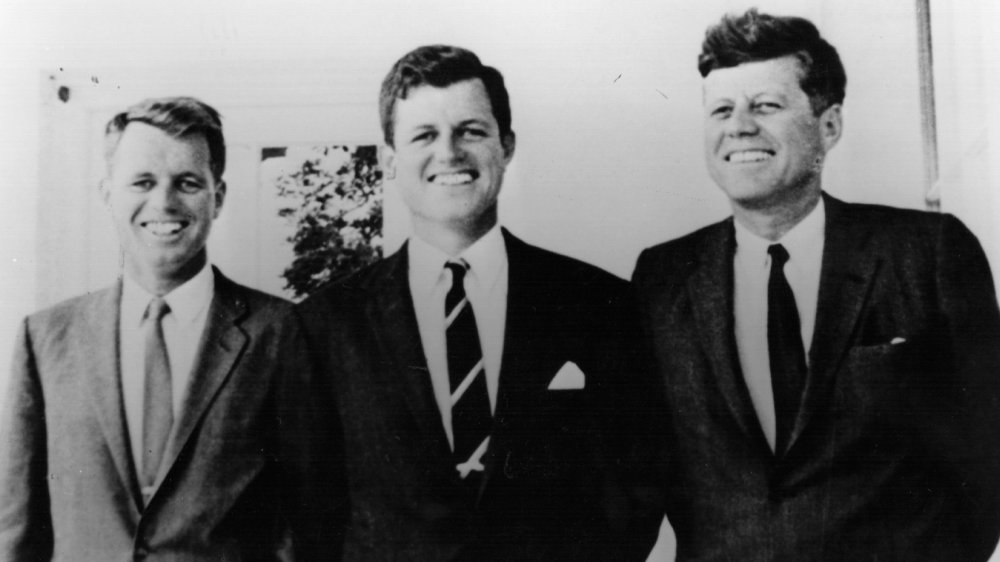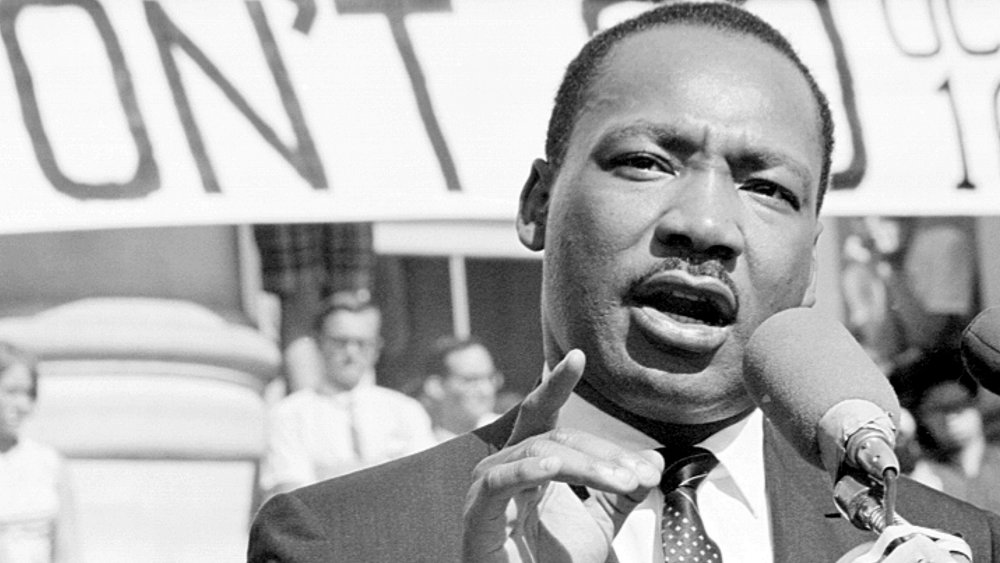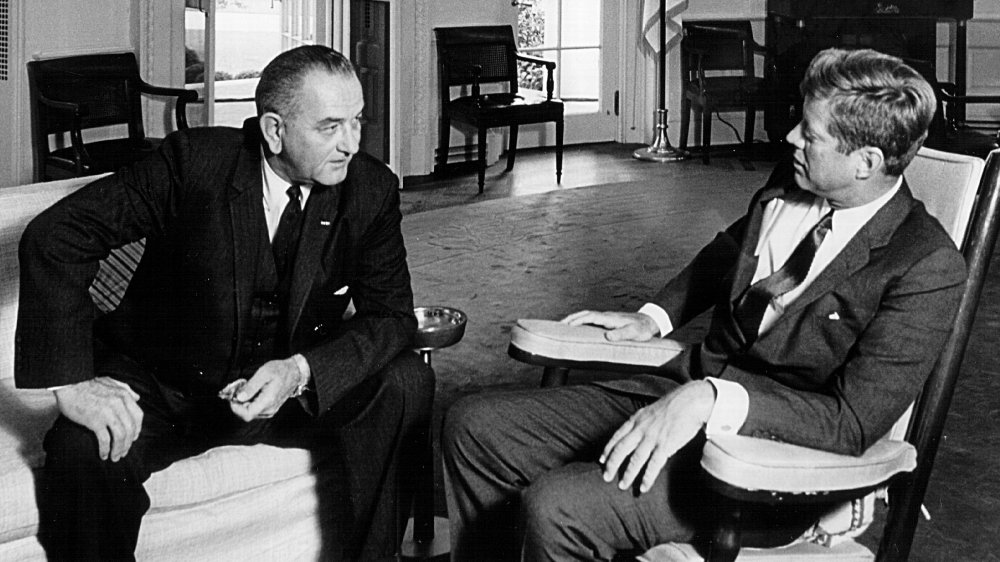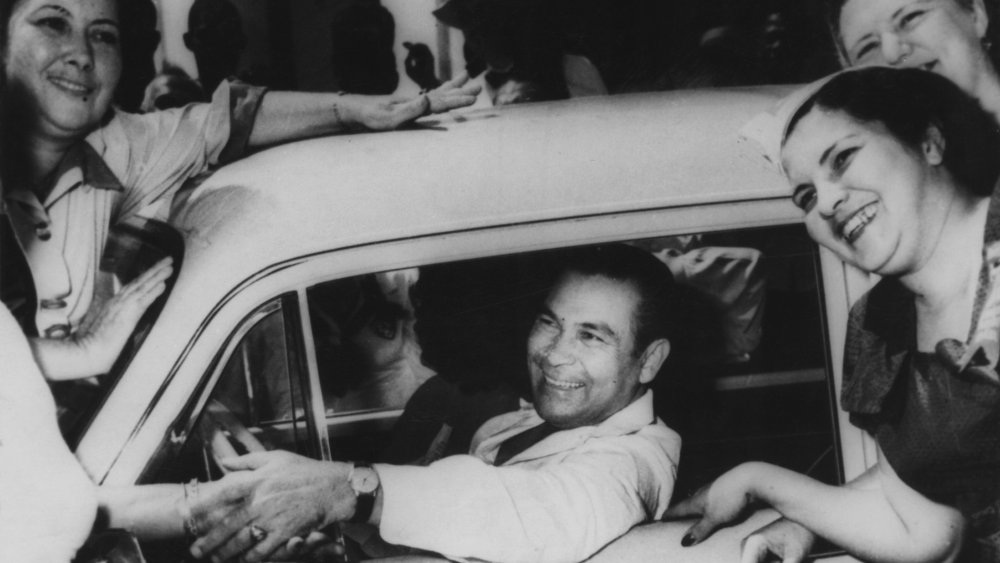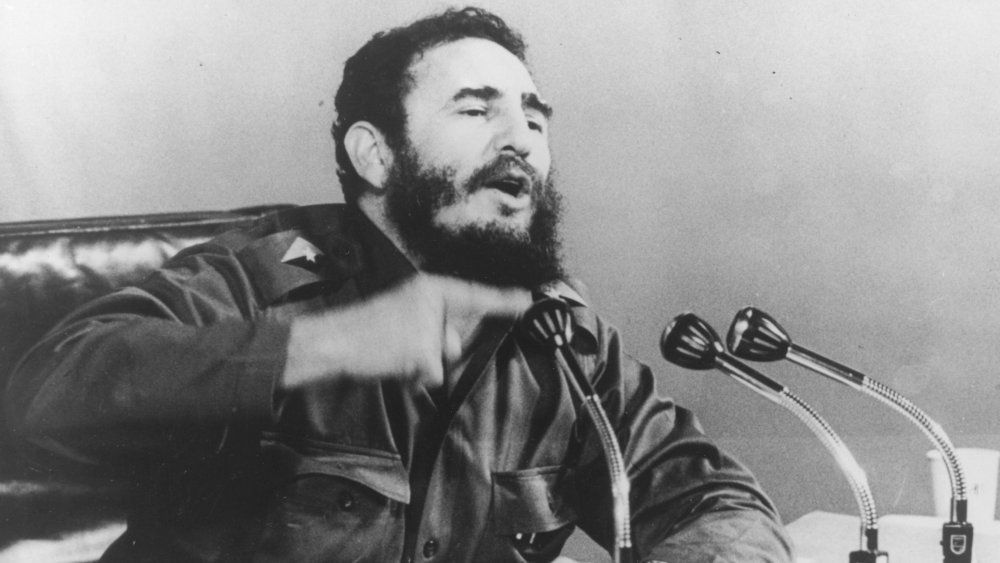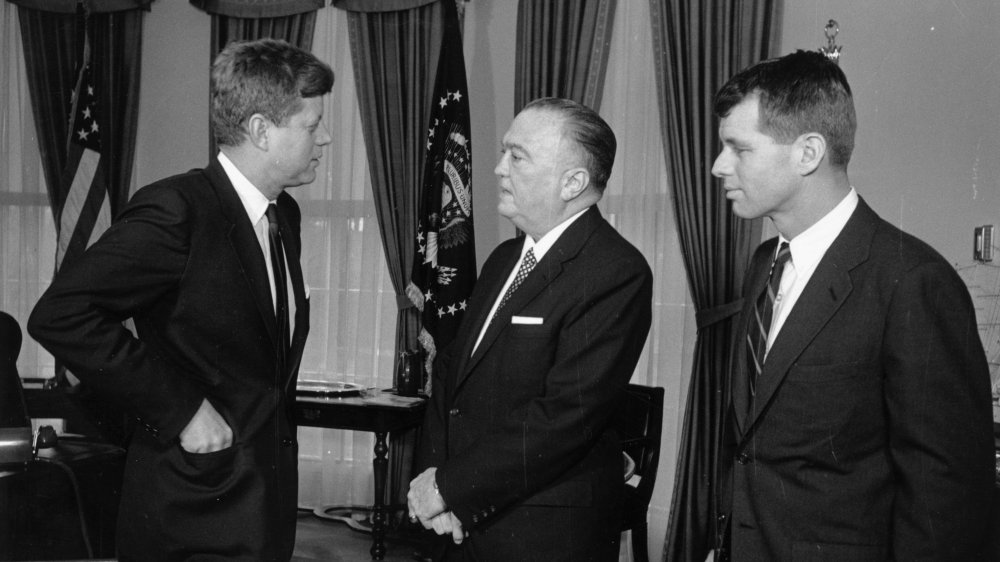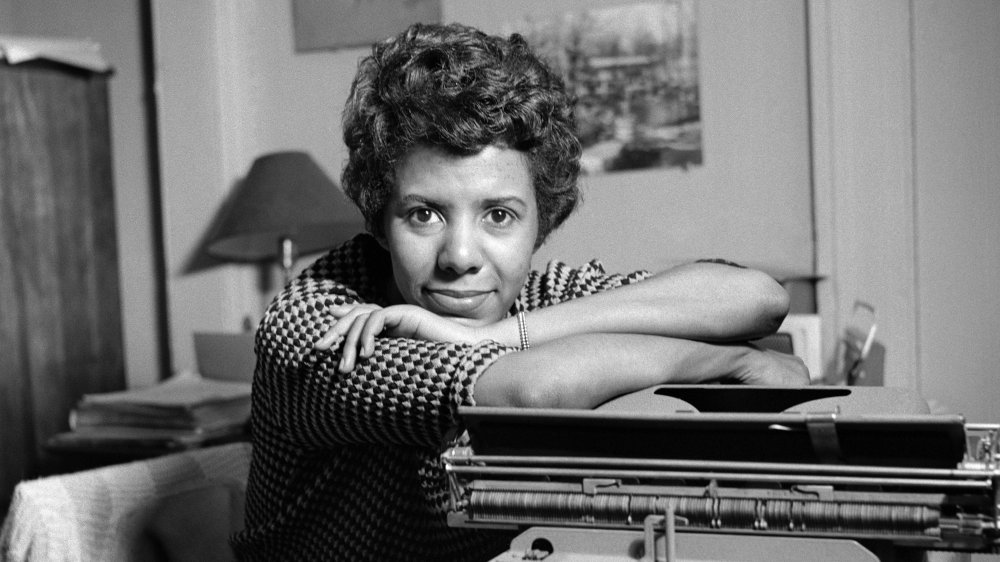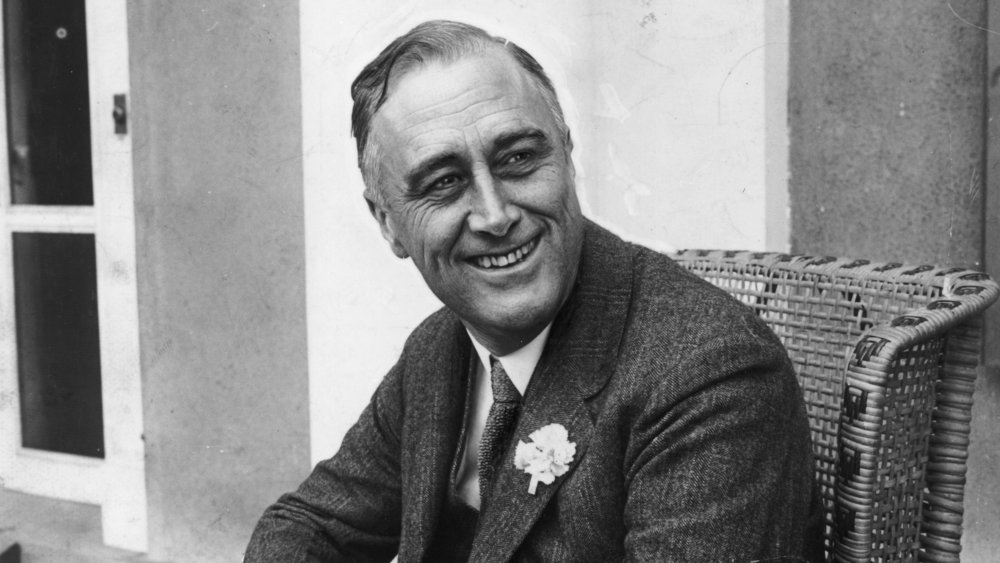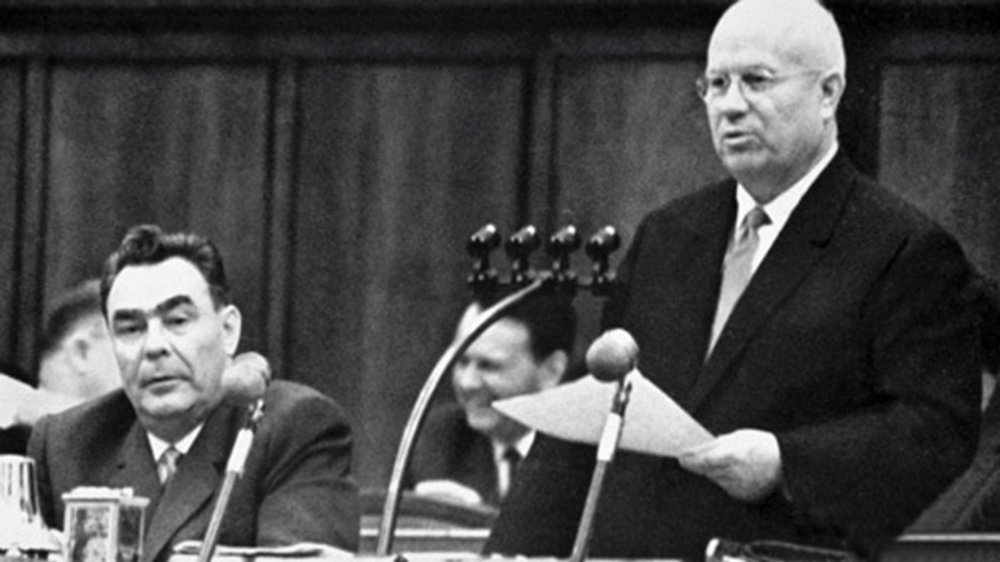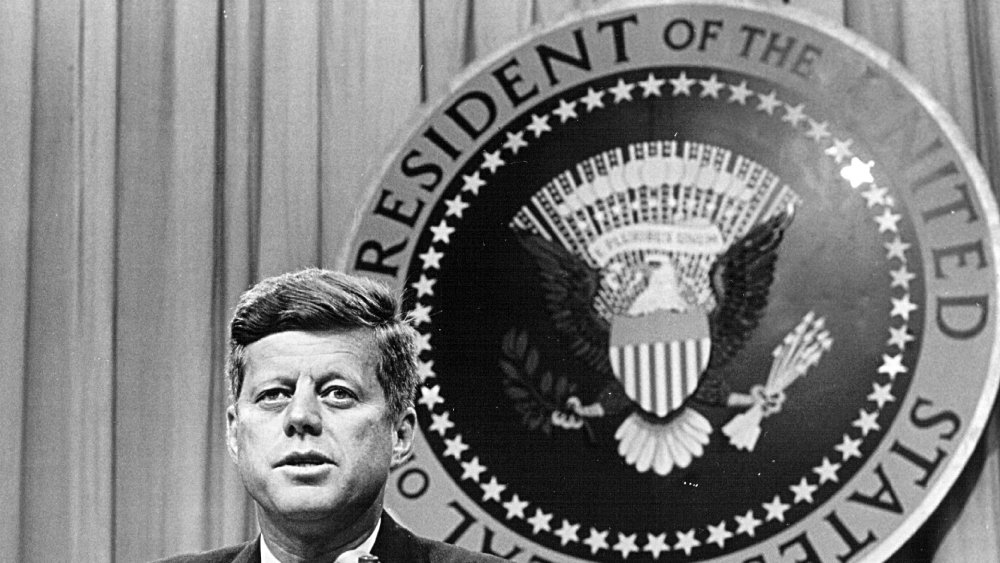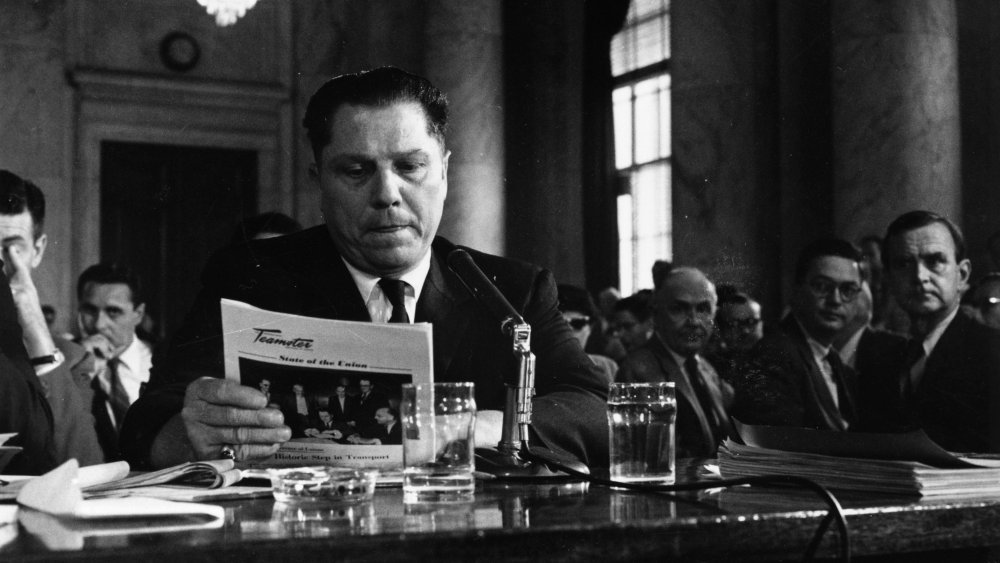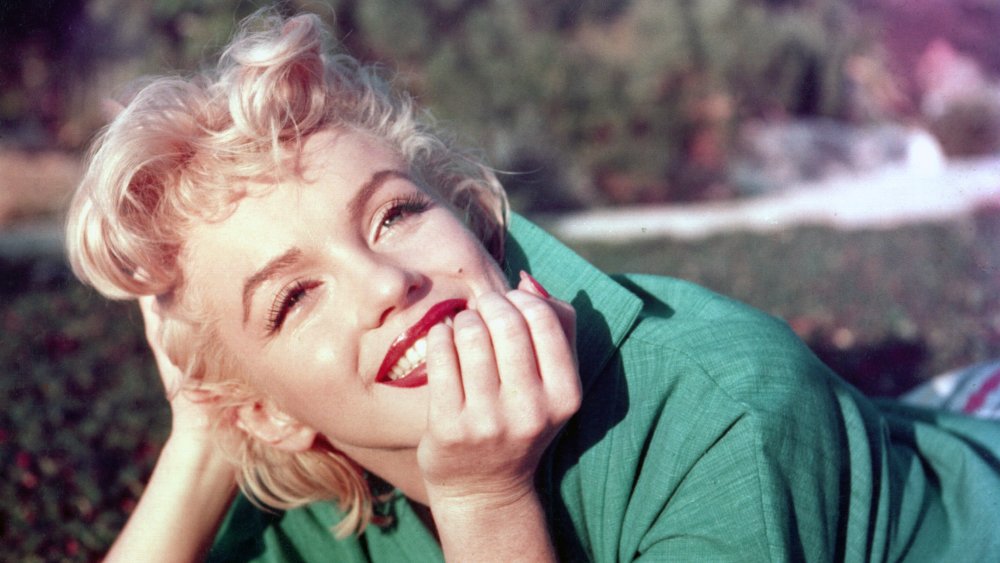Famous People The Kennedys Couldn't Stand
As the 1960s opened with a presidential election, the United States was about to enter its most turbulent decade in recent memory. Rising tensions inside and outside the country throughout the 1950s were ready to explode. Increased racial tensions from desegregation efforts by led by African Americans throughout the American South and the continued escalation of the Cold War around the world had taken the nation's peaceful evenings. In November 1960, the country held one of the closest presidential elections in US history, ending in the defeat of former vice president and Republican Richard Nixon and the election of the youngest president ever, the Democratic senator from Massachusetts, John Fitzgerald Kennedy.
Kennedy's election marked a new day in the nation. However, the president didn't come alone. JFK might have been elected, but the nation was introduced to the entire Kennedy family. Kennedy's younger brother, Robert Kennedy, was named as attorney general, and JFK's wife, Jacqueline "Jackie" Kennedy, became one of the most recognizable women in the world. The mythology of JFK was tragically immortalized by his assassination during his first term in 1963, setting the stage for a turbulent remainder of the decade as well as the question: "What if Kennedy hadn't been assassinated?"
The Kennedy family was iconic, glamorous, and very polarizing. They created as many enemies as friends, and they saw many individuals as enemies. Here's a list of famous people the Kennedys couldn't stand.
Dr. Martin Luther King Jr.
While both John and Robert Kennedy became known throughout the 1960s as supporters of the Civil Rights Movement, that didn't stop them from holding a lot of animosity toward the face of the movement itself. According to the King Institute, Dr. Martin Luther King Jr. was the subject of FBI investigations from the Montgomery Bus Boycott of 1955 until his assassination in 1968. The investigations during the Kennedy Administration were carried out with their knowledge and approval.
Their relationship was, as described by The Christian Science Monitor, one of "wary allies." In October 1960, then-candidate Kennedy made a call of support to Dr. King's wife, Coretta Scott King, during one of his many imprisonments. Robert Kennedy, JFK's campaign manager, called officials in the state and a judge to help spring King. Many believe this public act helped shore up Kennedy's election chances. Despite this, the Kennedys were wary of coming across as too strong on civil rights, while King and the people in the movement constantly held the administration's feet to the fire.
According to The Atlantic, when the Kennedy administration learned of a connection between King and New York lawyer and financier for the Communist Party USA Stanley David Levison, RFK ordered the FBI to have wiretaps placed on King's phone. The wiretaps introduced the Kennedys to King's extramarital affairs. Jackie Kennedy followed her husband's and brother-in-law's beliefs about Dr. King. According to Politico, the first lady referred to King as "phony" and "terrible" in a conversation with historian Arthur Schlesinger.
Lyndon B. Johnson
Talk about "keep your friends close and keep your enemies closer." By 1963, President Kennedy, according to ABC News, had spoken privately with his wife about his worries of an LBJ presidency and sought a way for his brother Bobby, who was the attorney general, to take the White House following JFK's presidency. Jackie remembers that her husband had no plans for selecting another vice president during his administration but looked forward to the 1968 Democratic Primary if he could influence the party to select another candidate aside from Johnson.
Still, JFK was willing to treat LBJ with respect during their time in Washington. The same could not be said of Johnson and Robert Kennedy. According to Politico, Johnson hated the president's younger brother to the point that, during his own presidency following JFK's assassination, he signed a nepotism statute. The law was seemingly a shot at Bobby, whose appointment as attorney general had sparked controversy. An aide of Johnson recalled the president referring to RFK as "a little sh*ta**."
In 1968, Johnson faced off against RFK one last time. The escalating Vietnam War had made Johnson very unpopular, and in March, RFK announced that he would run for president. Despite being the incumbent, Johnson saw the writing on the wall. Two weeks later, he announced he would not seek a second term.
Fulgencio Batista
It wouldn't be surprise for Fidel Castro to appear on a list of individuals hated by the Kennedys, but the man Castro overthrew was also disliked strongly by JFK. Fulgencio Batista was a brutal dictator, and Kennedy did not mince words when discussing the damage he had done to Cuba during his regime.
According to Britannica, Batista spent 11 years, from 1933 to 1944, as the efficient president of Cuba. He gained the position by, ironically, a revolt and, while enriching himself, helped improve the island nation's education system and economy. Eight years after his presidency ended, Batista took power in Cuba again in a bloodless coup and seemingly left his previous diplomacy behind to become a corrupt dictator, setting the stage for the Castro revolution to topple him from power in 1959.
In a speech a month before the 1960 election, candidate John Kennedy referred to Cuba under Batista as a "brutal, bloody, and despotic dictatorship" and lambasted the Eisenhower administration for arming and supporting the Batista regime, who, in turn, used their weapons on citizens, which JFK believed contributed greatly to the anti-American sediment in Cuba that led its people to turn to Castro and communism. Kennedy also used the speech to criticize the United States' support of dictatorships throughout Latin America in order to preserve American investments, believing the "rising discontent will provide fertile ground for Castro and his Communist friends."
Fidel Castro
Hey, there he is! It is almost ridiculous how many attempts on the life of Fidel Castro were made by the United States government. According to CNN, the Cuban revolutionary survived over 600 assassination attempts. Castro's reign in Cuba, just a stone's throw away from the United States, irked both JFK and RFK, and the two obsessed over ways to topple the communist leader.
In just his third month in office, President Kennedy authorized an invasion of Cuba made up of 1,400 Cuban exiles trained and armed by the CIA. The plan, according to the JFK Library, started during the Eisenhower administration in March 1960, and the US hoped that local Cubans would join with the exiled invasion force and overthrow Castro. On April 17, 1961, the Bay of Pigs invasion launched. By April 19, 1961, it was over, the exiles were captured, Castro's popularity was increased, and the Kennedy administration was left with egg on their faces for attempting to topple a foreign nation.
The administration exchanged $53 million worth of baby food and medicine for the return of the captured soldiers. According to PBS, while JFK questioned their ability to get rid of Castro, Bobby Kennedy took command of the situation, and the administration organized "Operation Moongoose," which sought to destabilize Cuba's economy and society in order to undermine Castro and his government. Despite all of this, Castro, according to The New Republic, was shaken by Kennedy's assassination in 1963.
J. Edgar Hoover
J. Edgar Hoover founded the FBI in 1935 and was its director until his death in 1972. Hoover compiled files on seemingly every figure in DC, including the young Kennedys. And he let them know it.
According to The Conversation, when Hoover became the head of the FBI, he had a very close relationship with both Franklin Roosevelt and Dwight Eisenhower, whom he saw as "an ideological ally." Throughout the 1950s, the FBI expanded their number of illegal microphones and wiretaps. While President Truman didn't have the best relationship with Hoover and the FBI, they were best friends compared to Hoover's relationship with the Kennedys.
Unlike previous administrations, during which Hoover could work directly with the president, John Kennedy's attorney general and de facto protector Bobby Kennedy made it so that Hoover had to go through him to get to JFK. In response, Hoover cut the number of political intelligence reports to the White House and started to delve into JFK's personal life.
Hoover leveraged Kennedy's affairs to get his own agenda across. The Washington Post reported that in 1963, Hoover told RFK that he'd discovered payments his brother made to a jilted lover, and according to The Dispatch-Argus, Hoover blackmailed Bobby to wiretap Dr. King with evidence of JFKs affair with Judith Campbell, who also shared a relationship with mobster Sam Giancana.
James Baldwin, Lorraine Hansberry, and others
What was supposed to be an informative meeting between Attorney General Robert Kennedy and a number of Black activists, intellectuals, and celebrities who were well-informed about civil rights turned into a very contentious affair. According to the National Museum of African American History and Culture, the meeting included James and David Baldwin; celebrities Harry Belafonte, Lorraine Hansberry, Lena Horne, and Rip Torn; and activists Edwin C. Berry, Kenneth Clark, Clarence Benjamin Jones, June Shagaloff, and Jerome Smith.
In an interview with NPR, Larry Tye, author of Bobby Kennedy: The Making of a Liberal Icon, discussed how the two parties came into the meeting with different intentions: "They came there [...] to tell Bobby what the situation was in American civil rights and what he ought to be doing. Bobby saw the meeting instead as his explaining all the things he and his brother were trying to do. He thought he should get a pat on the back; people thought he should get a kick in the butt."
During the meeting, Kennedy looked to James Baldwin for support, who, according to Vox, pointed to civil rights activist Jerome Smith and told the AG that he was the only man that Kennedy should listen to. Smith was on the front lines of the movement and had suffered multiple arrests and beatings throughout the South. Lorraine Hansberry (pictured above) grew so angry at RFK that she walked out of the meeting, followed by most of the other participants, Salon reports.
President Franklin Delano Roosevelt
The Kennedy family's history of feuding started long before John and Bobby. The two brothers followed in their father's footsteps, who, while working as the US ambassador to the United Kingdom, had a tense relationship with President Franklin Roosevelt.
Joseph Kennedy Sr. originally had a great relationship with FDR. In 1918, the businessman entered politics when he contributed money to the campaign of his father-in-law, John F. Fitzgerald, according to Warfare History Network. During the same time, Kennedy started to support Roosevelt. FDR did not forget Kennedy's support, and after he became president in 1933, he appointed Joseph as head of the Securities and Exchange Commission.
However, Joseph Kennedy had other goals. According to History Collection, he was interested in running for president following the end of FDR's second term. In 1938, Kennedy took a major step toward the Oval Office when FDR made him the ambassador to United Kingdom. Kennedy entered into a political whirlwind as Europe was on the cusp of war. Despite both English officials and FDR having given up on appeasing Hitler, Kennedy believed he could pay Germany to end their territorial expansion throughout Europe.
According to OZY, Kennedy met with Helmuth Wohlthat, a top Nazi economic adviser in London, against FDR's orders. By the autumn of 1940, Kennedy was forced to resign from his position following controversial comments stating that democracy was dead in England and questioning if it could survive in the US. The comments also ended his chances at the presidency.
Nikita Khrushchev
Some feuds might end in a fistfight. Some feuds end in cutting a person out of one's life. This feud nearly ended the world. Granted, the feud was less "Kennedys versus Khrushchev" and more "the capitalist West versus the communist East" and was about what direction would world politics would take in future generations.
JFK's first year in office was a disaster from a foreign policy perspective. According to History, when the two leaders held a meeting at Vienna only two months after the failed Bay of Pigs, Kennedy was overwhelmed by Khrushchev's experience and intelligence. Two months later, the Soviets began construction on the Berlin Wall, separating East Berlin from West Berlin. Frederick Kempe, author of Berlin 1961, argued that Kennedy could have prevented the wall if he was tougher at Vienna.
The next year, their feud almost reached apocalyptic levels during the Cuban Missile Crisis, when the USSR placed nuclear missiles in Cuba. According to Scientific American, Bobby Kennedy had spent the year following the Bay of Pigs preparing for the possibility of Cuba being used as a weapons hub. In the early days, he kept the option of invasion on the table. According to American Diplomacy, the administration avoided nuclear war by agreeing to remove their own missiles in Turkey and promising not to invade Cuba again in exchange for the Soviets removing their own missiles from the island nation, ending the two-week situation.
Members of the military
The president of the United States is the commander-in-chief of the military. Throughout the 1950s, the commander-in-chief was Dwight Eisenhower, a conservative, older man who had built his reputation as the supreme Allied commander in Europe during World War II. So it's not shocking that the men of Eisenhower's era clashed with the young JFK.
To his credit, Kennedy was a WWII hero himself, rescuing 11 of his Navy men and swimming for hours to an island after their ship went down from torpedo fire, according to History. Still, Kennedy wasn't as hawkish during his presidency as other officials in his administration. Following the Bay of Pigs failure, JFK questioned the CIA and National Security Council and concluded that he could not solely rely on them, according to JSTOR Daily. The administration's policy-making process changed, with a greater willingness to consider the pros and cons of decisions and how they would affect allies. During the Cuban Missile Crisis, this process helped prevent an invasion of Cuba, which would have led to nuclear war. This was despite pressure from individuals such as Air Force chief of staff General Curtis LeMay, who was recorded arguing with the president.
Another great "what if" with Kennedy was Vietnam. LBJ was a throwback and escalated the conflict during his tenure. According to The Atlantic, whether Kennedy would have done so is hotly debated, with evidence for both sides of the argument.
Jimmy Hoffa
According to The Oregonian, when JFK was assassinated, Teamsters Union president Jimmy Hoffa stood up in his chair and cheered at the announcement. He said later on, "I hope the worms eat his eyes out." Hoffa's anger was, however, less directed toward JFK and more at his younger brother Bobby Kennedy, who was involved in a "blood feud" with Hoffa, according to Kennedy's aide Pierre Salinger.
In 1957, the 32-year-old Bobby Kennedy was made chief council of Senator John McClellan's committee, whose primary focus was to investigate organized crime and corruption within labor unions. History states that this was where Hoffa and RFK first came in contact and began their continuous relationship, as Kennedy questioned the leader of the Teamsters Union. Hoffa took enjoyment in antagonizing the young Kennedy, while Kennedy's profile was raised throughout the hearings.
Click on Detroit said the two men's hatred toward each other was as simple as this: "Hoffa saw a spoiled rich kid. Kennedy saw a corrupt racketeer." Hoffa beat the charges levied against him during the 1950s, making him more popular within the Teamsters, though when JFK became the president and Bobby his AG, the younger Kennedy set up a "Get Hoffa" squad made of up 20 prosecutors in the Department of Justice.
In 1964, Hoffa's luck ran out. According to Biography.com, that March, Hoffa was found guilty of bribery and jury tampering, and in July, he was found guilty of misusing the union's pension funds.
Marilyn Monroe
The relationship between Marilyn Monroe and JFK, while certainly not Kennedy's only affair (Kennedy joked with associates that he would get a headache if he didn't have sex every day), is hands down the most discussed of the president's extramarital relationships, as Monroe and JFK were two of the biggest sex symbols of their time. Because of this, it has become close to impossible to nail down the extent of their relationship, as well as Monroe's relationship with Bobby Kennedy.
According to People, Monroe and JFK were introduced to each other in 1954 by actor Peter Lawford, who was married to Bobby's and John's sister at the time. Monroe's biographer, James Spada, said that Monroe and JFK had a relationship for a time, but after getting bored, Kennedy "passed her off" to Bobby Kennedy. In May 1962, Monroe performed at a birthday celebration for JFK, which involved her singing a sultry version of "Happy Birthday." Honey reports that, understandably, Jackie Kennedy was "fuming," though surprisingly not at Monroe but at her brother-in-law, who had arranged for the performance.
Four months after the performance, Monroe would die of a barbiturate overdose. While the coroner concluded it was a "probable suicide," theories have emerged that John, Bobby, or someone in the government had Monroe killed. Just two years after her death and a year after JFK's assassination, Business Insider reports that the FBI contacted Bobby Kennedy about a book being made blaming him for Monroe's death and revealing their alleged affair.
